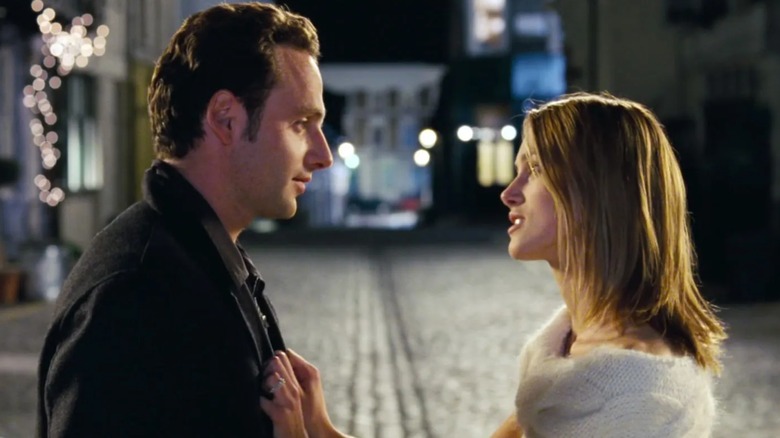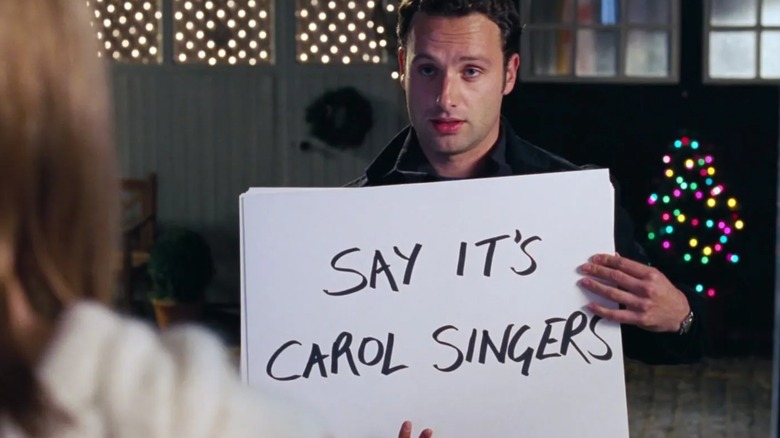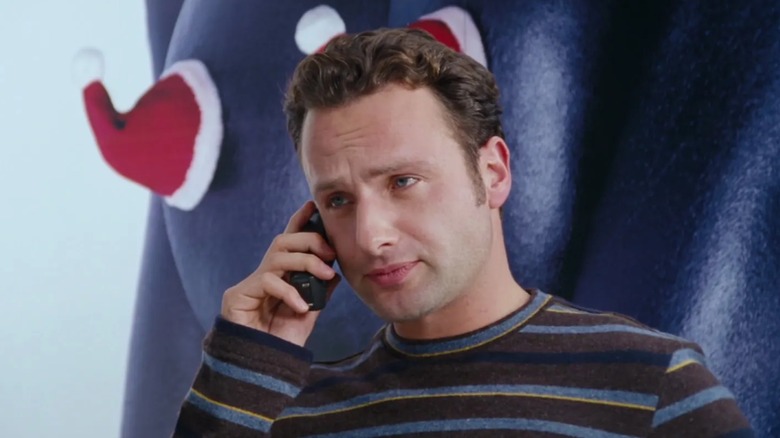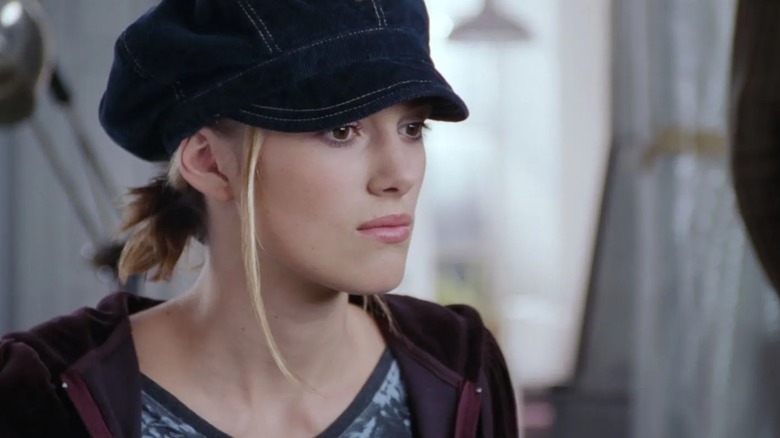The Classic Love Actually Scene That Didn't Age Well
Two decades and countless rewatches later, I'm still not sure if "Love, Actually" is a good Christmas movies or if it's just the most interesting one to talk about. If you've seen the movie — or even just been online around Christmastime in the past decade — you'll know all the familiar talking points. Fans can't believe that little kid ended up in "Game of Thrones," or that anyone could call Natalie fat. They think Laura Linney's character deserved better, but also, it's good to see a movie admitting that the holidays can be heartbreaking. The Colin Firth plot still makes romantics swoon (even though it has its faults), but Alan Rickman's character is a total snake.
Every subplot of Richard Curtis' ensemble film is worth talking about, but 21 years on, it seems clear that one gets discussed more than any other: the limply written love triangle between Andrew Lincoln's Mark, Chiwetel Ejiofor's Peter, and Keira Knightley's Juliet. Particularly, pretty much everyone seems baffled and put off by a scene at the film's climax, in which Mark confesses his forbidden love for Juliet via a series of cue cards he flashes outside her door on Christmas.
The angst over one of the weirdest scenes in "Love, Actually" has now become so ubiquitous that Curtis himself has weighed in. While giving an interview with The Independent for the film's 20th anniversary last year, Curtis explained that he didn't consider the scene particularly creepy until someone else pointed out the problems with it to him. "I remember being taken by surprise about seven years ago, I was going to be interviewed by somebody and they said, 'Of course, we're mainly interested in the stalker scene,' and I said, 'What scene is that?'" the filmmaker recalled. "And then I was, like, educated in it."
Andrew Lincoln's cue card gambit is pretty off-putting
Curtis thinks the reaction to the scene is a testament to a more progressive modern audience, but is upfront about the fact that no one involved in the filming found it off-putting back when the movie was being made. "All I can say is that a lot of intelligent people were involved in the film at the time, and we didn't think it was a stalker scene." he told The Independent, adding: "But if it's interesting or funny for different reasons [now] then, you know, God bless our progressive world." In a 2017 interview with Empire, Curtis told filmmaker Paul Feig that the sign scene came up often in fan interactions and that it was "not always unconditionally praised."
Cracked attempted to chart fans' changing reactions to the "Love, Actually" sign scene in its own 20th-anniversary piece, and while the retrospective gives the #MeToo movement a lot of credit for inspiring fans to re-examine the scene, it also notes that "Saturday Night Live" made jokes about how creepy it was back in 2014. What's more, Andrew Lincoln once told reporters he questioned the scene during filming, telling Entertainment Weekly in 2017 that he "kept saying to Richard, 'Are you sure I'm not going to come off as a creepy stalker?'" In that same retrospective, Curtis said that he was "retroactively ... aware that Andrew's role was on the edge," but that the actor's "openhearted and guileless" performance made it all work."
These characters got stuck in Love, Actually's most underwritten story
Curtis makes the right call here by actually digging into the context surrounding the heavily parodied scene, which is really what makes or breaks it. There's nothing wrong with making a grand romantic gesture for someone you love, and although there are certainly ethical questions to be asked about making one to someone who's already married, people do fall in love with others who are unavailable all the time. The movie's major problem here isn't so much the gesture as the underwritten plot leading up to it. We see Mark be a jerk, then reveal that he has feelings for Juliet via a scene in which she realizes the wedding video he took included mostly close-ups of her. All of this becomes creepy when the film refuses to focus on Juliet's feelings or include any sign that she might reciprocate Mark's — seemingly in order to add maximum suspense to their final scene and make her kiss a surprise.
Void of any response from Juliet for most of the movie, Mark just seems like a guy who was mean to his best friend's wife, then revealed a romantic fixation on her, then showed up at her doorstep with demands (he tells her to lie to her husband and say he's a caroler!), a non-apology, and a confession that puts her in an awkward position. If the film had included scenes showing that Juliet was unhappy with Peter, or that she was developing feelings for Mark, the final sequence would still be controversial, but it would pull off the bittersweet, heart-torn feeling it was going for. Instead, it takes the potential infidelity plot way too lightly, and the result is that Mark seems like a creep.
The love confession in Love, Actually still has its fans
Of course, not everyone agrees. Despite all the hubbub around the cue card scene, EW's Shirley Li wrote in 2016 that the movie pulled the odd, climactic moment off, saying: "Lincoln and Knightley sell the hell out of it: She laughs at the right times, he looks at her with puppy eyes, and even though this love story is all kinds of messy, it's a better idea to just let it do its thing instead of slicing it apart." In a poll posted by the website, 66% of readers voted that Mark was more of a "lovestruck sap" than a "stalker creep."
One of the scene's most notable supporters is Natalie herself, actress Martine McCutcheon. "I think people do crazy things when they are in love," the "Love, Actually" star told Digital Spy in 2020. "He had his moment where he thought 'enough now, I've told her how I feel, I love my friend too but I had to get it off my chest in the right way,'" she added, noting that the scene isn't his first love confession but a sweeter restating of the feelings Juliet had already gleaned from the wedding video. "She'd already seen the video, and I think it was his way of making things explained and comfortable," McCutcheon said.
If "Love, Actually" were made today, it would no doubt be different. It probably wouldn't include a reference to 9/11, women like Juliet would be presented as more than the object of mens' desires, and I personally hope to God superstar Billy Mack (Bill Nighy) would've smooched his manager (Gregor Fisher) on the mouth at the end. Instead, though, we're stuck with what we've got: a messy, funny, sappy movie that both fans and naysayers seemingly can't stop watching — even when Mark shows up with his cringey cue cards.



